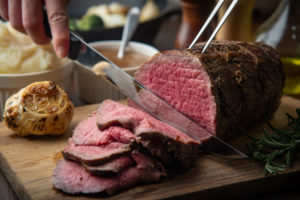
Seven dining dates worth your dollars
Aussies love to dine out and with such a wonderful array of cuisines and venues to choose from, who can blame us?
But the rising cost of living is making many consumers think twice about how much we fork out for food and where.
According to one recent survey, the average amount we spend in restaurants, cafes or bars, or ordering takeaway has slumped from $129 per month to $91, with more pain to come.
More than 80 percent of those surveyed said financial pressures had already affected their spending habits, and another 12 percent expected to have to cut back soon.
Eating out is seen as a luxury that can be dispensed with, while grocery shopping is essential. Australian households spend an average of $152 a week on groceries, or about $608 a month. This rises with the number of people in your house, so the average for a family of four, for example, is $203 a week or $812 a month.

Even with rising costs, it’s clearly cheaper to cook and eat at home, especially if you put more thought into your shopping. But that doesn’t mean you necessarily have to give up eating out – or ordering in. Just be a bit smarter about it. Aside from budgeting (the dreaded B word) so you can afford to do it occasionally, think about where you’re spending your money and why. That way you’ll feel satisfied long after the pleasure of eating someone else’s hard work has gone.
Making it worth your while
Some foods are just better eaten out (or ordered in) and we’ve rounded up seven (plus a favourite extra) that fit the bill. Before we tuck into them, however, let’s look at the reasons they make it onto our menu, and what else we should consider when we’re buying food.
Experience: The sheer pleasure of eating out
The pandemic made us appreciate many things we had taken for granted. As lockdowns and other restrictions forced us to eat at home, we really missed the simple joy of dining at a good restaurant. And good doesn’t have to mean expensive. It can be as simple as the local Thai or your favourite bakery, served by staff who have come to know you by name. It’s also a great way to enjoy the company of family or friends without anyone having to take responsibility for cooking or, worse, cleaning up! Just remember that the hospitality industry is still recovering from the impact of COVID-19, so lower your expectations a little and be kind.
Skill: The professionals do it better
Although some of us might watch cooking shows like My Kitchen Rules and think “I could do way better than that”, the truth is there are a lot of dishes that require more expertise than the average home cook possesses. We repeatedly make the same thing for good reasons – we don’t have to think about it, we know the family will eat it, and it doesn’t take an inordinate amount of time to prepare. While there might be nothing quite like Nonna’s lasagne or Dad’s spicy chicken wings, some dishes are just better left to the pros.
Time: There’s never enough
We're all busy people. Sometimes the dollars we save at the checkout aren't worth the time it takes to prepare certain foods. Juggling paid work, children and life in general takes its toll. By the end of the week, we’re often exhausted and can’t face even thinking about another meal to feed the family, let alone actually prepare and cook it. So, we resort to ready meals during the week, takeaway fast food on a Friday night, or decide to eat out at least once over the weekend. So long as it fits within your budget, why not? Just remember not to rely too much on unhealthy foods, as that also comes with hidden costs.
Waste: We throw too much food away
Australians throw out 20 percent of the food they buy, which equates to one out of every five bags of groceries, and adds up to a staggering 345kg per household every year. While we should all be doing what we can to cut back food waste – it produces methane, which is far more harmful to the environment than carbon pollution – it's also a hidden cost of our weekly grocery bill. Shopping more sensibly (such as sticking to a list or avoiding the shops on an empty stomach) will help cut waste and our food bills.
Seven foods worth eating out (or ordering in)
Like everything to do with discretionary spending, this is a matter of choice and preference. Sometimes we are driven by cost or convenience, but if you're going to treat yourself to a night off cooking, it should also be about taste. These are the foods we would recommend letting the professionals prepare.
Authentic experiences

We know this isn’t a specific ‘food’ but in a country blessed with so many cuisines to choose from, we couldn’t single one out for special treatment. This dining experience, even if you bring it home, is about sampling the best of another world. Most of us can whip up a quick Thai stir-fry or Italian pasta dish without too much hassle but there’s nothing like eating cuisine cooked by someone who really knows how to deliver the unique flavours. If you go with a group, there's the bonus of being able to share a bunch of dishes.
Cakes and pastries
If you like to cook, you’ve probably baked more than your fair share of cakes and biscuits. But if it’s a special occasion, it’s worth splurging on a professional cake. Pâtissiers have spent years honing their craft and can make something that not only tastes great but looks incredible, too. The same goes with fiddly, little pastries. Unless you have the time and inclination to spend hours in the kitchen, and you’re not too phased about how perfect they look at the end, leave this kind of baking to the experts.
Fish and chips
Battered fish and chips are a real treat, especially if you happen to find a reliable takeaway joint down by the seaside (the sound of the waves, if not the seagulls, elevates the experience). Yes, they are dearer to eat out (about $7.40 per person compared with $3.40 at home, according to Taste), but they are messy to make – what to do with all that oil afterwards, for starters. And, unless you have a big fryer, they are hard to make in volume and keep the chips and fish batter crunchy on the outside and soft on the inside. This is an easy family meal out, or to bring home on a Friday at the end of a long week.
Premium ice-cream
While many of us will have a tub of vanilla ice-cream in our freezers, we’re not talking bargain-basement store brands here. Real quality ice-cream takes time to make yourself (even with a pricey ice-cream maker) and, while it’s likely cheaper to make at home, the cost does add up the more adventurous you get. Unless you eat an inordinate amount of ice-cream (and we don’t encourage that for the bottom line or, ahem, the bottom), you’re better off finding a quality ice-cream outlet that makes this delicious treat from scratch and indulge in your favourite flavour every now and then.
Sensational seafood
Given how expensive seafood is to buy, it’s probably best to leave the cooking to the experts. If your pasta goes pear-shaped you haven’t wasted too much money but if you overcook the crab, king prawns, lobster or oysters you’ve forked out a pretty penny for, that’s a lot of dollars down the drain. You know quality seafood is going to come at a premium, so you may as well give yourself the best chance of getting bang for your buck.
Special ingredients
Foodies like to be on top of trends and try the latest restaurants. If they’re offering something out of the ordinary, all the better. A chef, for example, who specialises in native ingredients is going to produce a different taste sensation and one that you’re unlikely to be able to replicate at home. It’s also a good way to try unfamiliar food – if you see how the professionals treat artichokes, for example, you might be more inclined to give them a go yourself. (Or decide that it’s something you’ll only eat when out.)
Superb steak

Australians regularly cook meat on the barbie – many have boasted about those barbie skills, too - but steak will almost always taste better at good quality restaurants. They can buy better and have the storage to hang meat to ensure the best flavour when they cook it. Chefs also have the equipment that enables steak to be cooked at the right temperature how you like it (though you’re brave if you order well done). Consumers are prepared to pay for a premium for steak if we know it’s going to melt like butter in our mouths.
Did anyone say coffee?
OK, we know this takes us to eight and it’s a drink rather than food, but we can’t forget coffee. For starters, we consume a lot of it — about 2kg per capita a year.
Three-quarters of us have at least one cup a day and more than four in five (84 percent) pay for coffee each week.
Research also shows the older generation is more likely to opt for an instant fix at home, the younger generations lead the charge to their local barista.
It’s mostly about taste, too, rather than price. Even if you can afford one of the fancier coffee machines (while 65 percent of us have some form of machine at home, they tend to be at the lower end of the market), you’re unlikely to be able to replicate the skills of your favourite barista. It comes down to the quality of the beans and the equipment being used, as well as the person making it.
What if I don’t get what I ordered?
Eating out is generally an enjoyable undertaking – why else would we keep spending money to do it? But there are downsides, and not just the hit to the hip pocket.
According to the NSW Food Authority, the most common types of food complaints include reports of:
-
- Suspected food poisoning
- Unhygienic or incorrect food handling, storage, transport or preparation
- Foreign matter in food
- Allergens not listed in ingredients
- Allergens served in food when a declaration has been made
- Misleading or incomplete labelling
- Spoilage
- Unsuitable or unsafe ingredients
- Unlicenced sale or serving of food
In Australia, government authorities investigate food complaints, with different agencies from state to territory:
No matter what you order, you are entitled to get what you paid for. It’s even more galling when something doesn’t measure up if you’ve budgeted to give yourself a rare treat. If you didn’t get what you ordered or your delivery didn’t arrive on time, let us know and we’ll help you handle it.






